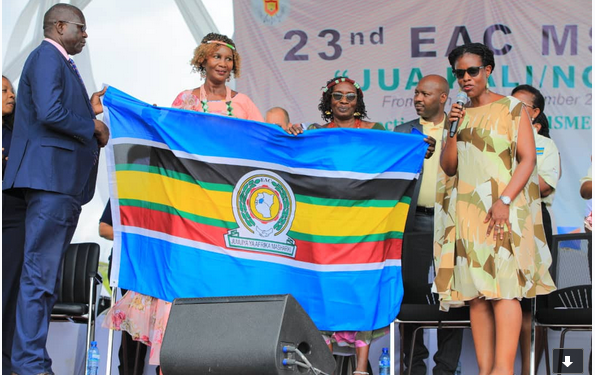By CHIMPREPORTS
The EAC Partner States and the EAC Secretariat have been commended for the commitment towards supporting the development and growth of the Micro, Small and Medium Enterprises (MSMEs) sector over the past twenty-three years.
Burundi’s Minister of Trade, Transport, Industry and Tourism, Hon. Marie-Chantal Nijimbere, further urged the Partner States to devise mechanisms to support inclusive and sustainable growth of MSMEs in the region.
Hon. Nijimbere said that such mechanisms include the establishment of current and transparent regulatory framework; piloting and scaling up of micro-credit and loans guarantee solutions and facilitating universal access to ICTs and other basic infrastructure to enable MSMEs close information and technological gaps.
Hon. Nijimbere was speaking when she officially closed the 23rd EAC MSMEs Trade Fair at the Cercle Hyppique Grounds in Bujumbura, Burundi. The trade fair that opened its doors on 5th December, 2023 attracted exhibitors from Burundi, Democratic Republic of Congo, Kenya, Rwanda, South Sudan, Uganda and Tanzania.
The Minister stated that MSMEs make a significant contribution to economic growth and sustainable development worldwide, nothing that globally MSMEs represent about 90% of businesses, and more than 50% of employment worldwide, contributing up to 40% of national income in emerging economies.
“MSMEs have a central role to play in the achievement of our socio-economic development goals at both the region and continental level, including the realization of the 2030 Agenda for Sustainable Development and the African Union (AU) Agenda 2063,” said the Minister.
“To facilitate the transformation of MSMEs in the region, we must therefore strive to address the challenges faced by MSMEs such as low productivity, poor competitiveness due to use of inadequate technology and equipment, high cost of utilities, unfavorable regulatory requirements, limited access to finance and markets, and weak managerial and entrepreneurial capacities,” she added.
In her remarks, the EAC Deputy Secretary General in charge of Customs, Trade and Monetary Affairs, Ms. Annette Ssemuwemba, noted that 1,015 exhibitors showcased products ranging from woodwork; handicrafts; processed products including spices; textile; garments; leather; herbal medicine and natural beauty products; footwear; processed food; furniture; machines – agro machinery, juice making machinery; and energy stoves.
“While our artisans from across the region have exhibited their innovative works, we take cognizance of the urgent need to eliminate barriers holding back MSMEs in intra-regional trade”, she said.
“The EAC Secretariat reiterates its commitment to addressing these issues and will engage with Partner States to create a favorable and conducive regulatory and business environment for MSMEs participating in trade across the region,” added the Deputy Secretary General.
Ms. Ssemuwemba called upon all artisans at the trade fair to remain resilient in their efforts to access the wider market offered by the seven EAC Partner States, while being continuously innovative.
“You must strive to grow and utilize the various initiatives at national and regional level to attain higher heights in your business, in terms of product quality, value-addition, packaging as well as marketing,” she added.
The 23rd edition of the EAC MSMEs Trade Fair was convened under the theme: Connecting East African MSMEs to enhance Intra EAC Trade. The main objective of the Trade Fair is to contribute towards the realisation of the region’s development goals and aspirations by lending support to this budding sector of the economy, which needs public patronage and Government support to make it sustainable.
The trade fair also featured symposia aimed at enhancing awareness and building the capacity of MSMEs on intra-regional trade opportunities and the various trade provisions of the EAC.
During the symposia, the MSMEs noted the need to further develop Kiswahili as the trading language of the region. Additionally, the MSMEs called on the Partner States to fast track the implementation of a single currency, noting that a single currency would significantly enhance intra-regional trade, owing to the elimination of currency conversion.
In a bid to further enhance intra-regional trade, the delegation from the Democratic Republic of Congo (DRC) appealed to the Partner States that are yet to waive visa requirements for DRC citizens to do so to better facilitate the integration of DRC into the Community.
During the closing ceremony, it was officially announced that the Republic of South Sudan would host the 24th edition of the annual event, which is held on a rotational basis among the Partner States.









Discussion about this post